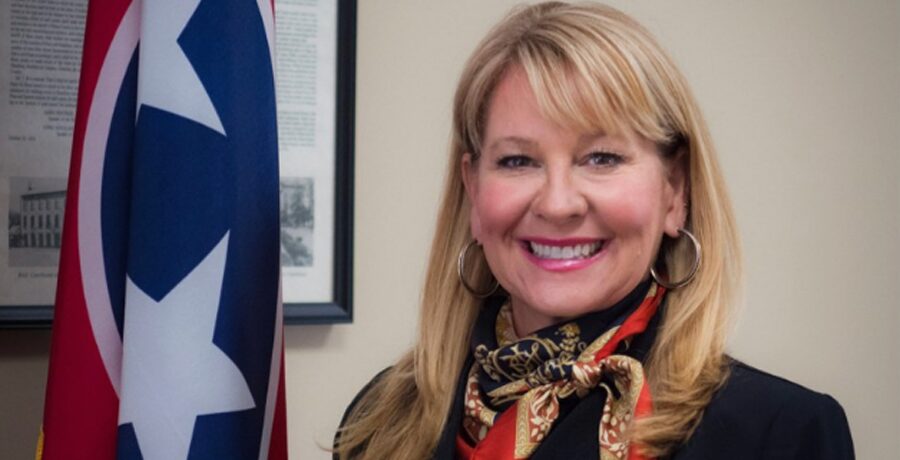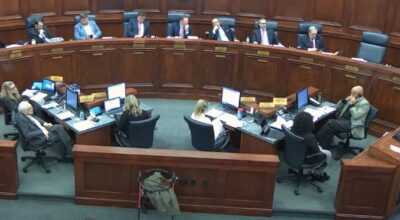
Judge Christie Sell serves the general sessions court in Hamilton County, Tenn., a venue for plea bargains and settlements. (Photo Christie Sell on LinkedIn)

My phone as recording device was under my notes at a hearing before Judge Christie Sell, indicating I was skulkingly recording without telling her, and that this is a breach of court rules. She ordered my record deleted, with aid of a deputy. (Tulis Report)
CHATTANOOGA, Tenn., Thursday Jan. 25, 2024 — At a hearing in my criminal case Thursday, Jan. 18, in the 1:30 p.m. docket, I stood before Judge Christie Sell on two charges relating to Title 55, motor and other vehicles, for which deputy Brandon Bennett kidnapped me and put me into the Hamilton County jail.
Being slow of speech and a little slow on legal topics, I had in hand a wireless phone with the recorder app running. Judge Sell stopped the proceeding and accused me of having breached court rules and dishonored her office by recording the proceedings without asking permission. I was not there as a journalist, who under Rule 30 is required to get judicial permission to use press gear such as laptop, cameras and recording devices. I stood before her as criminal defendant.
She detected my phone “hiding” under my papers. She ordered the bailiff to delete the record.
Is her treatment in keeping with state law for courtroom recording, and the Rule 10 code of judicial conduct rules prohibiting prejudice?
The law states;
It is lawful for attorneys representing parties in proceedings in any of the courts of this state to use tape recorders as an aid in making notes of the proceedings.
Tenn. Code Ann. § 20-9-104
This rule necessarily applies to pro se, in persona propria and special appearance parties, among which I would be included. A man in charge of his own case is, effectively, his own attorney. No law operates to disfavor one class of litigant over another. This law is not open to any interpretation allowing for barring of record-keeping phone use in any Tennessee court.
The rule identifying attorneys has to be understood a permission to them as applying to pro se defendant. The people have a right to the court; the attorney has a privilege of being in court because it is his place of business, and he pays privilege fees to be there. If the rule does not apply to pro se defendants, it would be an institutional or structural prejudice against probably a majority of the people who stand before Judge Sell in sessions court. That would be, people without aid of counsel or representation.
If Judge Sell’s rule applies to all pro ses, they are prejudiced as a class. If her rule applied only to me, it would appear to be a personal prejudice not authorized by Rule 2.3, which says,
A judge shall not, in the performance of judicial duties, by words or conduct manifest bias or prejudice, or engage in harassment, including but not limited to bias, prejudice, or harassment *** .
This breach is not the worst I encountered at that hearing in which I insisted the court had no subject matter jurisdiction. But it is significant because it implies that all defendants are harshly treated by Judge Sell in this matter.
What about sessions judges Gary Starnes, Lila Statom and Alex McVeigh?
I am writing Judge Sell asking for an explanation about whether we accused members of the public pro se have the right to record, or whether there is an institutional oppression against all people acting in their own defense apart from a hired gun and bar member attorney.


If those who have authority in the state violate the state’s rules, does turning to the state work?
In the Bible the Lord gives only two punishments for man to enforce, restitution and death. Note prison is not a command of the Lord. It is not the state but the people who carry out the punishment, such as in Lev 20:2, 24:16, Deu 13:9, and the like.
When the Christian community has one of its members violated as the Lord describes, why turn to the state for redress? Clearly the community is limited by the state to perform capital punishment, but we can and are even commanded to call out or publicly rebuke those in violation of the Lord’s commands, such as in 2 Tim 4. The purpose is not revenge but reconciliation.
Publishing an article that few will see might have little impact. Emailing a targeted list might be more effective as those involved, their associates, news organizations, and others that could have a serious impact. Putting these tools in the hands of the victim, not an organization, is the focus of the ShofarLeaks project.
Interested parties should contact me.
Judge Christie Sell violated Mr. Tulis’ “Due Process and Constitutional Rights” due to illegal “Customs and Usages” and “Policies and Practices” under the color of law in “BAD FAITH”. The court was aware Mr. Tulis was representing oneself in “Propria Persona” and legally should have allowed the accused to audio record the hearing with his cellphone.
Mr. Tulis also challenged the court “Subject Matter Jurisdiction” which the court verbally said “I believe we have “subject matter jurisdiction”? According to United States case law once “Subject Matter Jurisdiction” is challenged a court “MUST PROVE” it on the record, this wasn’t done by Judge Sell. SEE: Hagans v. Lavine, 415, U.S. 528, 533 (1974).
Also since, deputy Bennett wasn’t present at his “Show Cause” hearing on January 18, 2024 which it is NOT the accused arraignment, the court trying to exact a plea from the accused intelligently REFUSED to plea and challenge the court “Subject Matter Jurisdiction” whether “Personam” and/or “Subject Matter” which the court had neither and could NOT lawfully proceed, but did anyway unlawfully, sending the Bogus charges to a “Grand Jury” with Mr. Tulis “mistakenly agreeing”.
When he could have respectfully argued and demanded the case be dismissed now ‘MINISTERIALY” because the accuser deputy Bennett is NOT present at his own “Show Cause” and has NOT proven “Jurisdiction/Authority” to enforce Title 55 “Federal Transportation” law and deputy Bennett admits on audio recording Mr. Tulis was NOT driving in commerce and there was NO harmed or injured Man.
WHEREFORE, deputy Bennett “Affidavit of Complaints” on all misdemeanor charges are “VOID AB INITO” and there’s NO sufficient charging instrument to invoke the court authority to hear or adjudicate the VOID case and must DISMISS this case MINISTERIALLY.
One has to STAND one’s GROUND and assert one’s “Due Process, Constitutional and Civil Rights” to the corporation, because the corporation and some member’s of the corporation hired to represent their client’s the “Citizenry of the Republic” will “Knowingly and Intentionally NOT assert and fight their client’s rights and plea bargain one out on a deal with the state.
So one, has to be VIGILANT and STAND one’s GROUND at a moment notice to take over ONE’S case and fight for ONE’S Rights and STAND firmly upon them.
As far as I understand it, it’s just about the recording (telephone recording) in the criminal trial. Then ask the judge whether your job is more important than the defendant’s job and whether the criminal trial will be conducted publicly, if “yes” then there is probably a lack of equality of arms for both sides in the process